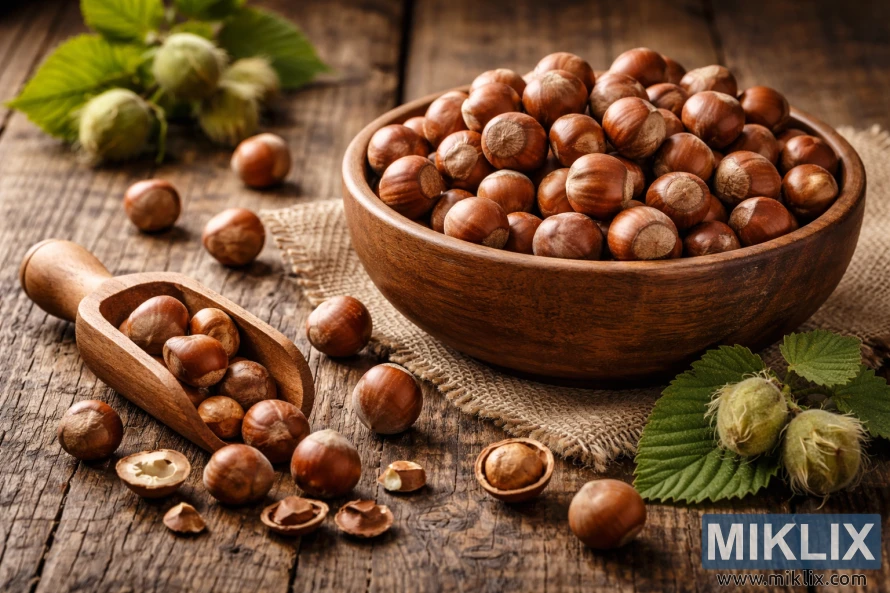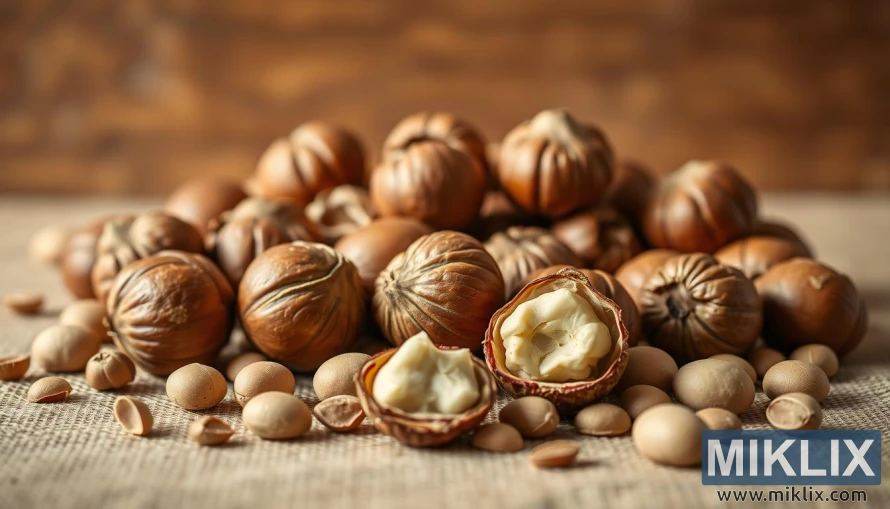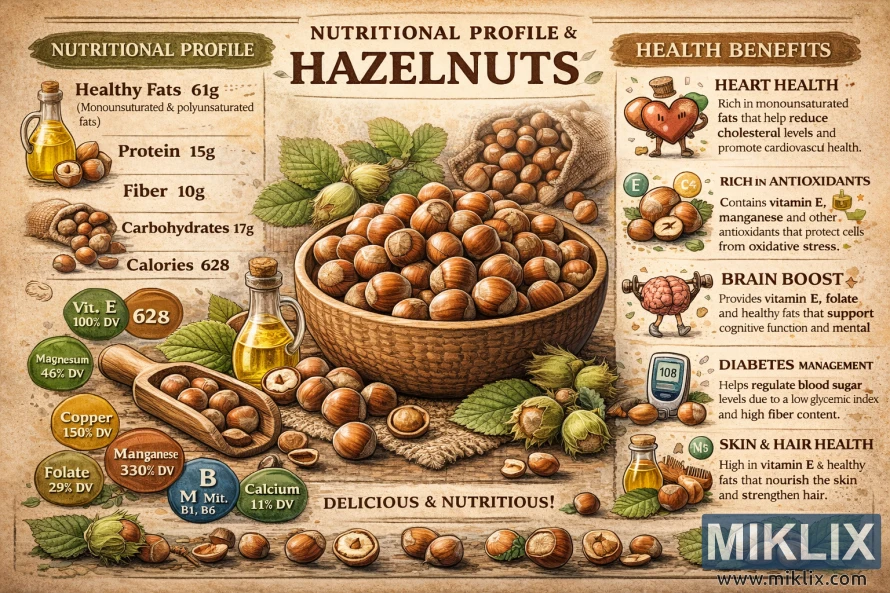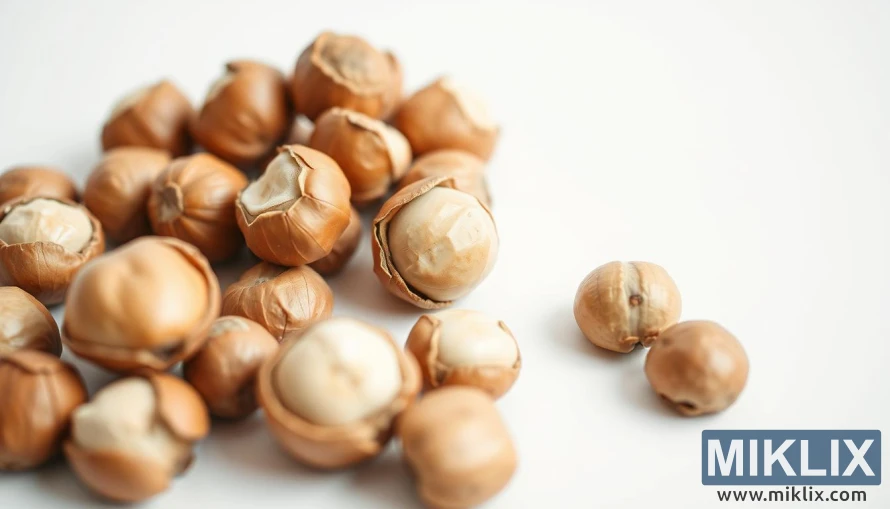Hazelnuts Uncracked: The Tiny Nut with Mighty Health Perks
Published: May 12, 2025 at 7:53:48 PM UTC
Last updated: December 26, 2025 at 11:23:26 AM UTC
Hazelnuts are a tasty addition to any diet, known for their rich flavor and health perks. These small nuts are full of vitamins, healthy fats, and antioxidants. They help keep your heart healthy, aid in weight control, and lower cancer risk. In this article, we'll explore the health benefits of hazelnuts. We'll also look at their nutritional value and how to add them to your meals.

Key Takeaways
- Hazelnuts are packed with essential nutrients that promote overall health.
- Regular consumption of hazelnuts can improve heart health.
- These nuts contain antioxidants that help reduce cancer risk.
- Incorporating hazelnuts into your diet can aid in weight management.
- Hazelnuts support healthy cholesterol levels and blood sugar control.
Introduction to Hazelnuts
Hazelnuts, known scientifically as Corylus avellana, are tree nuts with a sweet taste and health perks. They are mainly grown in Turkey, Italy, Spain, and the United States. Their flavor is rich and sweet, making them a favorite in many dishes.
You can eat them raw, roasted, or as a creamy paste. This versatility adds to their appeal in both sweet and savory dishes.
Adding hazelnuts to your meals can boost both taste and nutrition. They are often used in baked goods, desserts, salads, and savory dishes. Including hazelnuts in your diet can bring many health benefits, making them a great choice for a balanced diet.
All About Hazelnuts
Hazelnuts are small, round nuts that grow in clusters on hazel trees. These trees start producing nuts in 4 to 6 years, making them quick to grow. Their rich flavor is great with many tastes, like chocolate. This is why they're loved in both sweet and savory dishes.
There are many types of hazelnuts, each with its own special qualities. For instance, 'Barcelona' nuts have a high yield and big kernels. 'Corylus avellana' nuts are known for their excellent taste. Growing hazelnuts requires good soil and a mild climate.
Hazelnuts are not just tasty; they're also good for you. They have less fat than many nuts, which makes them easier to digest. As they become more popular, hazelnuts are being used in new and exciting ways worldwide. They show how versatile and appealing they are.
Nutritional Profile of Hazelnuts
Hazelnuts are not only tasty but also packed with nutrients. A one-ounce (28 grams) serving has about 176 calories. This makes them a great snack choice. They also have 17 grams of fat, mostly the good kinds.
They offer 4.2 grams of protein and 4.7 grams of carbs per serving. Plus, they have 2.7 grams of dietary fiber. This fiber is key for a healthy digestive system.
Hazelnuts are also a powerhouse of vitamins and minerals. They are rich in:
- Vitamin E (21% of the Recommended Daily Intake)
- Thiamin (12% of the Recommended Daily Intake)
- Magnesium (12% of the Recommended Daily Intake)
- Copper (24% of the Recommended Daily Intake)
- Manganese (87% of the Recommended Daily Intake)
This high amount of vitamins and minerals makes hazelnuts a great choice for a healthy diet.
Health Benefits of Hazelnuts
Eating hazelnuts can make you healthier. They are full of good stuff like nutrients and healthy fats. This makes them great for a healthy diet.
Hazelnuts are good for your heart. They have fats that help lower bad cholesterol and raise good cholesterol. This can help prevent heart disease.
Hazelnuts also help fight inflammation. Chronic inflammation can cause many health problems. Eating hazelnuts can help manage this. Their antioxidants help fight oxidative stress and reduce inflammation.
Hazelnuts can help with weight management too. They are high in calories but also in fiber. This fiber helps you feel full longer, which can prevent overeating.
They are also good for your digestive system. Hazelnuts have fiber that helps with regular bowel movements and a healthy gut. This supports proper digestion and nutrient absorption.
Lastly, hazelnuts help control blood sugar and improve insulin sensitivity. They are good for people with diabetes. Including them in your diet can help with glucose metabolism.

Hazelnuts and Heart Health
Hazelnuts are good for your heart because they are full of nutrients like omega-3 fatty acids and antioxidants. These help fight oxidative stress. This stress can harm your heart.
Eating hazelnuts often can lower your risk of heart disease. It does this by:
- Lowering LDL cholesterol levels
- Reducing inflammation
- Improving overall heart function
Adding hazelnuts to your meals can help prevent high cholesterol. This makes your heart healthier. It's a great way to take care of your heart.
Reducing Cancer Risk with Hazelnuts
Antioxidants play a huge role in keeping us healthy, and they might help fight cancer too. Hazelnuts are full of antioxidants like proanthocyanidins and Vitamin E. These help fight oxidative stress, which can harm cells and might lead to cancer.
Studies show that proanthocyanidins in hazelnuts could help prevent and treat some cancers. While more research is needed, the early results are promising.
Eating hazelnuts regularly can add to your health and might even lower your cancer risk. Their antioxidants support overall health and could help protect against cancer.
Hazelnuts: A Source of Antioxidants
Hazelnuts are not just tasty; they're also good for you. They're packed with antioxidants that help fight off oxidative stress. Phenolic compounds in hazelnuts are key in this fight. They help reduce the risk of heart disease and cancer by battling free radicals.
The skin of hazelnuts holds most of their antioxidants. Eating hazelnuts with their skins is best for getting these benefits. This way, you get more nutrients and enjoy a delicious snack. Adding hazelnuts to your meals can be a tasty way to boost your health.
Improving Cholesterol Levels with Hazelnuts
Eating hazelnuts can really help your cholesterol levels. Studies show they can lower bad LDL cholesterol. This is good because high LDL cholesterol increases heart disease risk.
Hazelnuts are full of healthy fats. They also have lots of nutrients. These help keep your heart healthy.
Adding hazelnuts to your diet can bring big benefits:
- Lowering LDL cholesterol levels
- Boosting heart health
- Helping you eat well without gaining weight
This makes hazelnuts a great choice for meals or snacks. They're perfect for those who want to keep their cholesterol in check.
Maintaining Healthy Blood Sugar Levels
Hazelnuts are great for keeping blood sugar levels healthy. They have a special mix of nutrients that helps your body use insulin better. This is good news for people with type 2 diabetes and metabolic syndrome.
Research shows that eating hazelnuts can help control blood sugar. Their healthy fats help keep blood sugar stable. This means you'll have more steady energy all day long.
Hazelnuts taste amazing and are good for you, too. They're packed with benefits for blood sugar control. Snacking on them or adding them to your meals can make your diet better.
Potential Weight Management Benefits
Studies show that adding nuts, like hazelnuts, to your diet can help with weight management. This is important because many people struggle with weight gain and obesity. Eating hazelnuts regularly might help lower obesity rates, making them a great snack choice.
Hazelnuts are packed with fiber and protein. These nutrients help you feel full, which can help you eat fewer calories. Eating them mindfully can lead to eating less overall.
In short, hazelnuts are a tasty and healthy part of a balanced lifestyle. By controlling how much you eat, you can enjoy them and help manage your weight. This can also reduce the chance of gaining unwanted weight.

Enhancing Digestive Health with Hazelnuts
Hazelnuts are a great source of dietary fiber, which is key for good digestive health. Fiber helps keep bowel movements regular and prevents constipation. It also supports a healthy gut microbiome, which is vital for our overall health.
In a 28-gram serving of hazelnuts, you get about 2.7 grams of fiber. This can help you meet your daily fiber needs easily. Adding hazelnuts to your diet boosts digestive health and gives you a tasty, nutritious snack.
Adding hazelnuts to your meals or snacks can boost your fiber intake. Try them in salads, smoothies, or as a yogurt topping. This way, you can enjoy their benefits.
Hazelnuts and Their Effects on Inflammation
Hazelnuts are not just tasty; they're also good for you, mainly in fighting inflammation. They have anti-inflammatory properties that help lower body inflammation markers.
Studies show that eating hazelnuts can greatly reduce inflammation. Their high levels of healthy fats are key to this effect. They make a great addition to a healthy diet.
To get the most benefits, eat hazelnuts as part of a balanced, calorie-controlled diet. This combo boosts their health benefits and supports your overall health.

How Hazelnuts Support Cognitive Function
Hazelnuts are more than just a tasty snack; they're packed with nutrients that boost brain health. They're full of vitamin E, omega-3 fatty acids, and antioxidants. These help keep your brain sharp and healthy.
Studies show that hazelnuts' antioxidants protect the brain from damage. This is key in keeping our minds sharp as we get older. Vitamin E, in particular, supports our brain's health, which may lower the risk of memory loss.
Adding hazelnuts to your meals is a tasty way to improve your brain power. Eating them regularly can help your brain stay healthy and focused. Try them in salads, smoothies, or as a quick snack.
Incorporating Hazelnuts into Your Diet
Hazelnuts are versatile and great for your diet. You can enjoy them raw, roasted, or ground. Try adding them to your favorite recipes for tasty snacks or to improve the taste and texture of meals.
Here are some ways to add hazelnuts to your daily meals:
- Sprinkle chopped hazelnuts on salads for added crunch.
- Incorporate ground hazelnuts into baked goods like muffins and cookies.
- Blend roasted hazelnuts to make a rich hazelnut butter, perfect for spreading on toast.
- Add whole hazelnuts to trail mix for a satisfying snack option.
- Use hazelnut flour as a gluten-free substitute in pancake and waffle recipes.
With so many options, you can enjoy hazelnuts every day. They add flavor and health benefits to your meals.
Portion Control and Serving Suggestions
When you add hazelnuts to your meals, it's key to control your portions. These nuts are full of good stuff, but they have a lot of calories because of their fat. A good serving size is about one ounce (28 grams). This way, you get the health perks of hazelnuts without overdoing it on calories.
Here are some tips to enjoy hazelnuts without overeating:
- Add a handful of chopped hazelnuts to your morning oatmeal.
- Blend them into smoothies for added texture and flavor.
- Use crushed hazelnuts as a topping for yogurt or salads.
- Bake them into muffins or bread for a subtle crunch.
Remember, watch your serving sizes, even more so with flavored or salted ones. Hazelnuts are best when they're plain or lightly seasoned. This keeps their health benefits intact.

Conclusion
Hazelnuts are a great mix of taste and nutrition, perfect for any diet. They help your heart, have antioxidants, and might lower cancer risk. Adding them to your meals makes food taste better and boosts your health.
Adding hazelnuts to your daily meals is fun and good for you. You can put them on salads, mix them into smoothies, or just snack on them. They offer many health perks, and eating them in the right amounts can improve your nutrition and health.
Choosing to eat hazelnuts is a smart way to make your diet better. They taste amazing and are full of health benefits. So, they're more than just a snack; they're a key part of a healthy lifestyle.
Further Reading
If you enjoyed this post, you may also like these suggestions:
- An Apple a Day: Red, Green, and Golden Apples for a Healthier You
- Enjoying Almonds: The Small Seed with Big Benefits
- The Mighty Mango: Nature’s Tropical Superfruit
